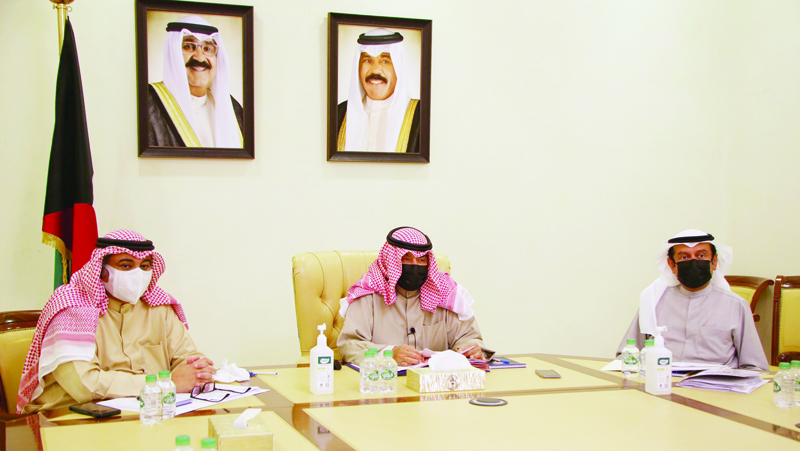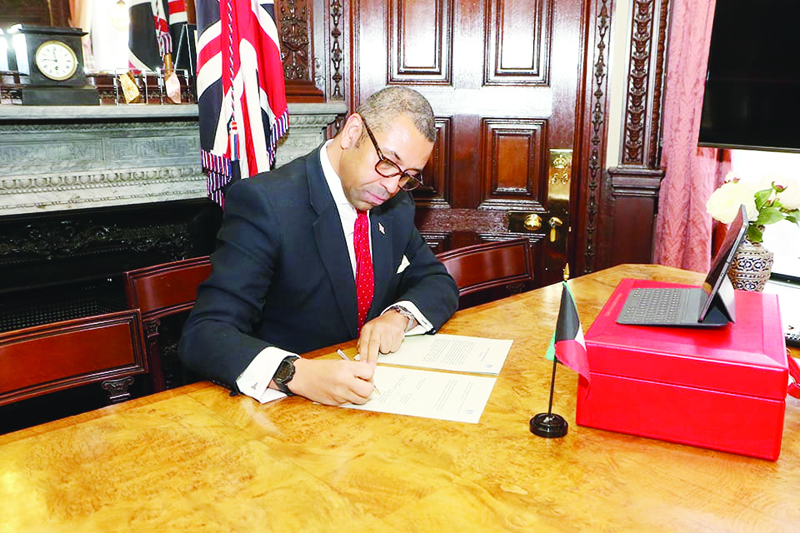
KUWAIT: Kuwaiti Deputy Foreign Minister Khaled Al-Jarallah and the UK Foreign, Commonwealth and Development Office (FCDO) Minister for the Middle East James Cleverly have signed during a virtual meeting yesterday the action plan of the 16th meeting of the UK-Kuwait Joint Steering Group, which was held over the summer.
The UK-Kuwait Joint Steering Group reflects the two countries' commitment to working together to advance the close Kuwait-UK relationship to the benefit of both countries. The UK-Kuwait Joint Steering Group covers a wide range of issues, including healthcare, security, defense, cyber security, trade, investment, education, higher education, scientific research, environment, culture, migration, and international development.
The defense sub-group focused on ways to strengthen cooperation between the two countries especially on training and joint exercises. The discussions covered Exercise Desert Warrior, emergency planning and crisis response and training of Kuwaiti forces in the UK. Kuwait has agreed to host a regional Aviation Security Conference in 2021. The cyber security sub-group has agreed that Kuwait will host a virtual second Cyber Security Education Research Conference this month. The trade sub-group has agreed to hold joint webinars on digital health, agri-tech, ed-tech and food security.
The two parties also agreed to complete cooperation mechanisms, originating from the talks, to strengthen economic and commercial relations and partnerships by encouraging investment in vital and promising sectors in both countries and to discuss commercial opportunities in both countries. The British side, for its part, confirmed the continuation of cooperation with Kuwait after its exit from the European Union.
The two sides also expressed their satisfaction with the current volume of trade, which amounts to GBP 3.4 billion, as well as their shared aspiration to exchange experiences, with regard to small and medium enterprises, amid their role in supporting national economies.

Healthcare cooperation
On cooperation in the healthcare field, the two ministers welcomed ongoing talks, which see Kuwait benefit from Britain's advanced healthcare expertise, particularly in relation to hospital management and the training of Kuwaiti medical personnel. The two sides stressed the need to strengthen collective efforts to confront the coronavirus pandemic, while the Kuwaiti side expressed its hope to benefit from Britain's efforts made to produce a vaccine.
They also discussed shedding light on means to enhance cultural and scientific bilateral cooperation, commending the current growth of these aspects amid the dispatch of Kuwaitis to pursue academic studies under various disciplines in the UK and efforts to identify and overcome the difficulties these students face, created by the COVID-19 pandemic.
It was also agreed during the meeting that cooperation between the FCDO and the Kuwaiti Fund for Economic Development should include joint initiatives in the Horn of Africa; and on education in Somalia. The science and environment sub-group agreed to hold a UK-Kuwait Science Technical Dialogue, including workshops on plastic to fuel conversion.
British Ambassador Michael Davenport thanked the Kuwaiti Ministry of Foreign Affairs and all other participating Kuwaiti government ministries for the excellent co-operation which made possible the first ever virtual Joint Steering Group. He added that this JSG has produced concrete action points whose implementation will further deepen the close bilateral relationship.
The two ministers also reviewed wider bilateral co-operation and compared notes on regional issues. The Ministers thanked officials for progress made during the work of the Joint Steering Group and underlined the importance of the Joint Steering Group to fostering closer ties and to realize technical level cooperation - the breadth of discussions demonstrating that the historic relationship, built around the cornerstones of defense, security and trade, continues to evolve to meet modern challenges, including cyber security.

